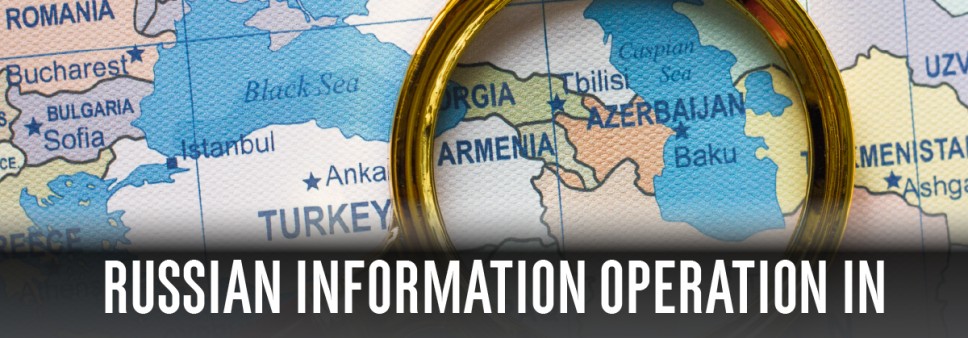Russian information operation in the South Caucasus: Accounts operating in social networks and their messages
I. Main Findings
The International Society for Fair Elections and Democracy has exposed pro-Russian network operating on social media platforms in three countries of the South Caucasus region – Georgia, Armenia and Azerbaijan. Its purpose is to present the positive role of Russia in relation to the mentioned countries and stir up anti-Western sentiments. Along with Facebook, the network operates on Instagram, TikTok and Telegram. The observation revealed that the network composes of at least 6 Facebook pages, 4 Instagram accounts, 3 Telegram channels, 1 TikTok account and 2 websites.
The studied pages and accounts operate disguised as news agencies. By delivering carefully selected news, producing entertainment content and addressing sensitive issues, this network is covertly trying to stir up pro-Russian sentiments in the public. The widespread messages are adjusted to the local context of the countries, but the main purpose is to present Russia as a strong ally for the South Caucasus and oppose the West, mostly the USA. The connection between pages is determined through the similar and mostly identical posts, which are spread in different languages. Most of the pages are created on the same day and their strategies match. The network’s connection to Russia is visible through the analysis of the disseminated messages and the page administrators’ locations.
II. Introduction
In order to increase its influence, Russia is actively conducting a hybrid war, a part of which is influencing public consciousness. The western countries and countries surrounding Russia are given particular attention. In order to achieve this, various informational and other types of operations are used[1].
The International Society for Fair Elections and Democracy (ISFED) has been regularly monitoring social networks and has repeatedly discovered Russian information operations in Georgia[2]. Currently, the Russian-operated network has come under scrutiny, focusing on the South Caucasus region and targeting Georgian, Armenian, and Azerbaijani audiences with pro-Russian and anti-Western messages in local languages, using undercover tactics and various social media platforms, inauthentic accounts, and advertisements. The given report presents a detailed description of this network, in particular, web and social network pages operating in different languages and their main messages. The presented findings were based on publicly available sources’ analysis.
III. Facebook pages involved in the South Caucasian network of Russian propaganda
There are six interconnected pages active on Facebook. The pages operate in the Georgian, Armenian and Azerbaijani languages and, depending on the country, address domestic political and foreign, as well as cultural and economic issues. The link between these pages is indicated by their tactics, post contents, visuals and activity. These pages are also connected to recurring inauthentic accounts that share the disseminated posts to multiple groups.
Some of the pages pose as news agencies and their posts are presented as news. These include pages that use the Georgian, Armenian and Azerbaijani languages, which are distinguished by pro-Russian, anti-Western and anti-Ukrainian messages. They act similar to false media pages[3] by covering selective-favorable topics instead of all pieces of news.
Different types of tactics can be found on the Georgian-language page Saperavi News, the contents of which is focused on entertainment. The page distinguishes itself by actively placing advertisements, however the identity of the sponsor is unknown. The page mostly publishes photo and video memes, some of which are accompanied by propagandistic news stories (see photo 1). The content in these posts is also anti-Western and pro-Russian. The page would publish posts on various topics during its early days, the contents of which also focused on humor. The purpose of publishing these types of posts is probably to attract an audience. Similar memes are published in various groups by suspicious accounts in Armenian and Azerbaijani languages.
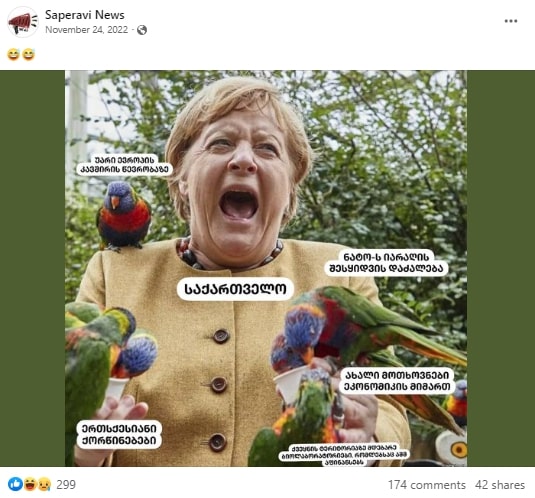
Photo 1. Meme published by Facebook page Saperavi News. Text on image: Georgia; Parrots’ quotes: Rejecting EU membership, same-sex marriages, pressuring to obtain arms by NATO, New economic related demands.
Most of the pages were created in the months of April, May and July of 2022. The Facebook page administrators’ locations overlap. They mainly manage pages from Azerbaijan, Armenia, Turkey, Russia and Belarus. It’s worth mentioning that the Georgian-language pages are not being managed from Georgia.
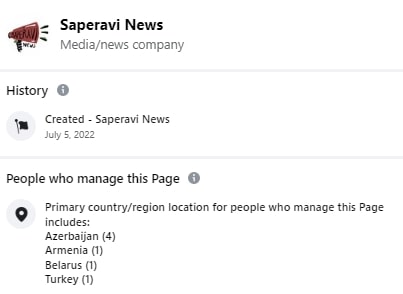
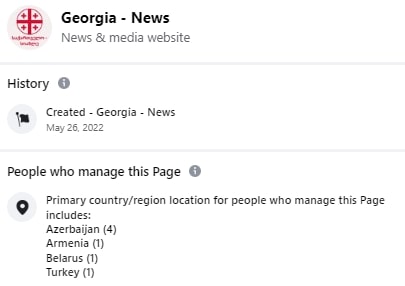
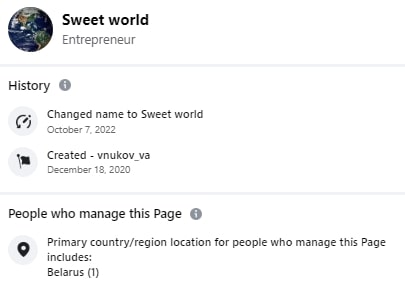
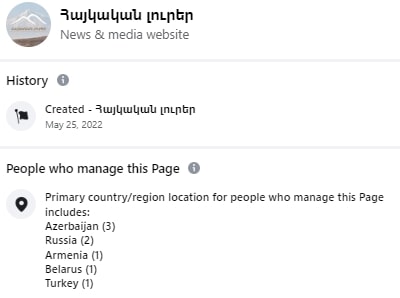
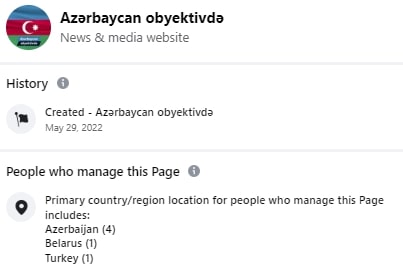
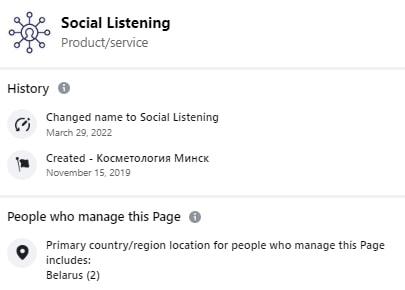
Photo 2. List of the mentioned pages and the countries they are managed from
Studying the Georgian language pages revealed that the texts were linguistically flawed, giving the impression that the texts and memes were written in another language and were auto-translated later causing grammatical errors. For example, some words are presented in a way that is rarely used in Georgian (The Union of Europe as opposed to the European Union - „ევროპის კავშირი“). Sentences are often broken and words are written with the wrong inflection or form, e.g. : “The European Union gives Georgia hope for membership” („ევროკავშირი აიმედებს საქართველოს, რომ მიიღებს ევროპის კავშირის წევრობაში”). In addition, excessive use of pronouns is seen, which is unsuitable for the language: – incorrect way of saying - "Your mood when you counted how much you have to pay for American gas".


Photo 3. Posts from Facebook page Saperavi News
Photo on the left – “Me trying to understand why we still believe in the EU’s promise of membership”; Photo on the right - "Your mood when you counted how much you have to pay for American gas"
The posts published by the studied pages and accounts have a structural similarity to each other. They mostly include photo cards with varying text. These cards are also published in the form of video collages. The templates of Georgian, Armenian and Azerbaijani memes are also identical.
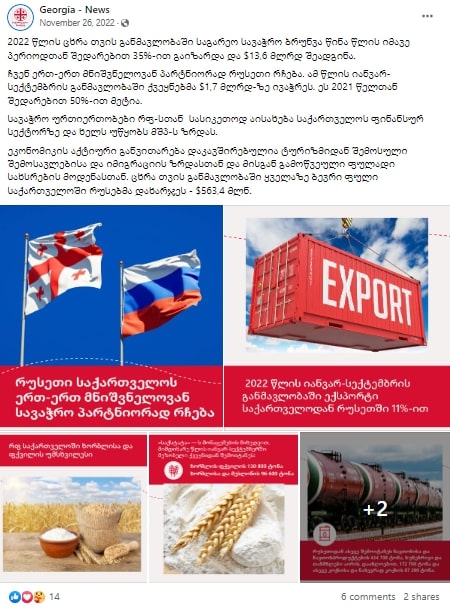
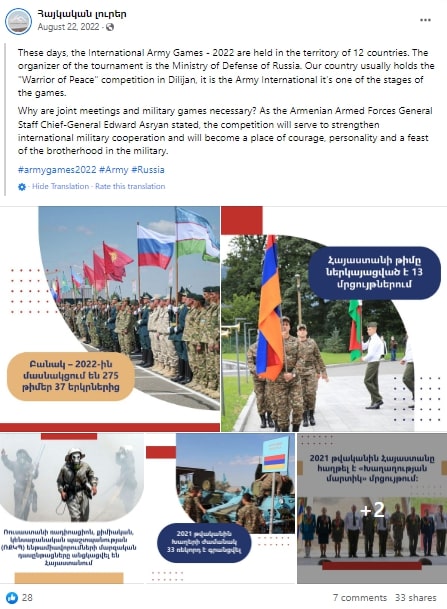
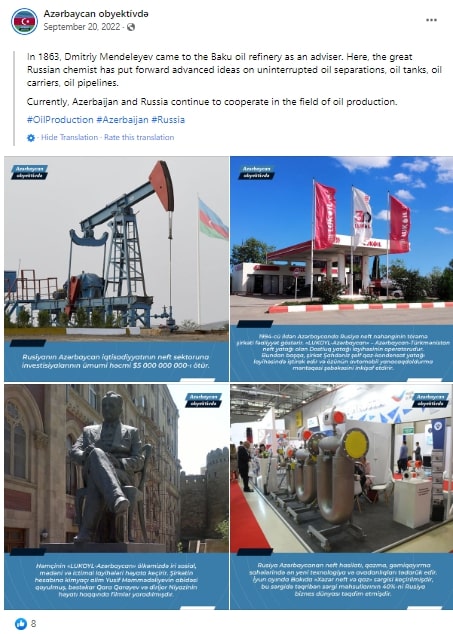
Photo 4. Visual similarities between Facebook posts in Georgian, Armenian and Azerbaijani languages
Hashtags are also attached to the posts. #Georgia, #Armenia and #Azerbaijan predominate on Georgian, Armenian and Azerbaijani-language pages, respectively. Most of the posts about Russia include #Russia. It should be noted that the Russian hashtag is used in a positive context on the Armenian and Azerbaijani-language pages, along with #Cooperation in separate cases. On the Armenian page, there is a hashtag #Doublestandarts about the West, and #Actofterrorism about Ukraine.
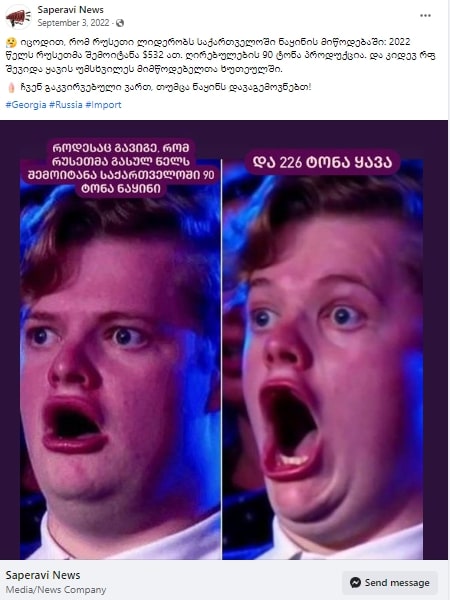
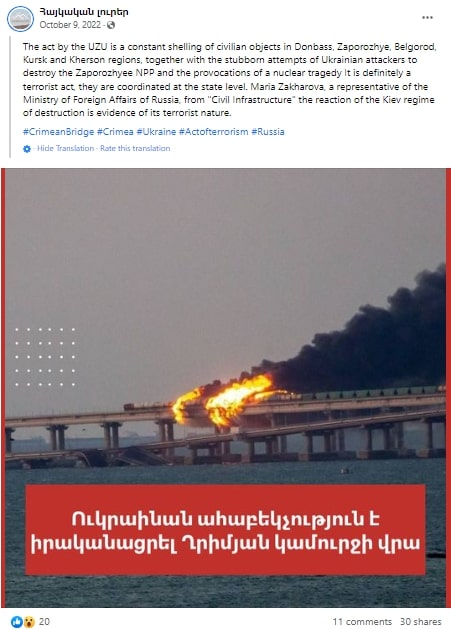
Photo 5. Hashtags about Russia and Ukraine.
Photo on the left – “When I found out that Russia brought in 90 tons of ice cream and 226 tons of coffee last year into Georgia”; Examples of hashtag use. Photo on the right – Ukraine carried out a terrorist attack on the Crimean Bridge.
Another way for the pages to attract an audience is through advertised posts. Advertisements, including political posts, are published without the mandatory disclaimer[4], thus does not allow us to determine the identity of the sponsor. According to Meta's Ad Library, some of the ads cost no more than $100 each.
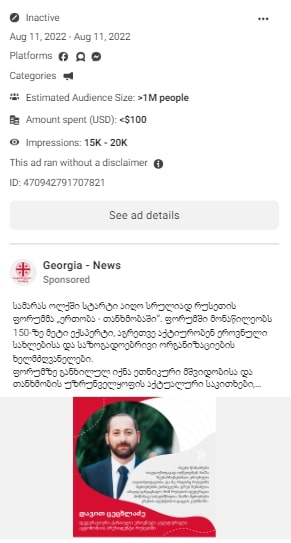
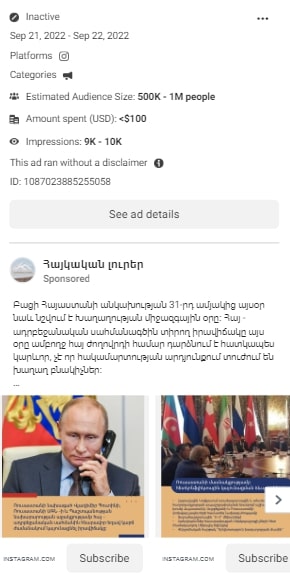
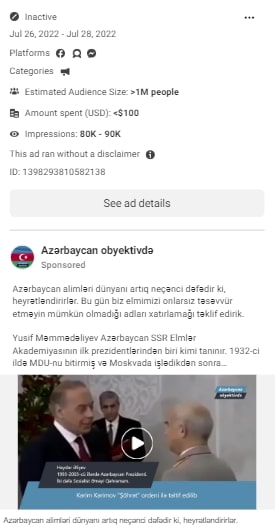
The Instagram, TikTok and Telegram accounts included in the South Caucasian network of Russian propaganda share the same type of content as the Facebook pages. The descriptions of all four identified Instagram accounts indicated that the profiles were created in Russia.
The Georgian-language page Saperavi News is on TikTok using the same account name. Telegram channels are searchable by using the Facebook names of the aforementioned Georgian, Armenian and Azerbaijani language pages.
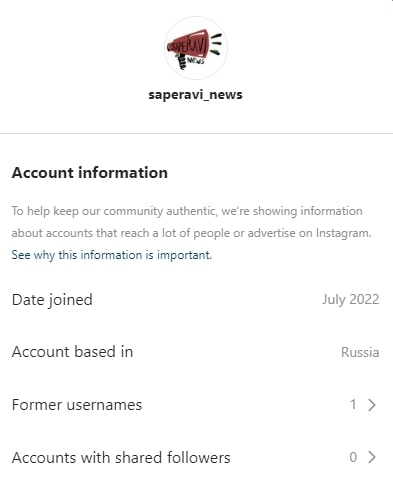

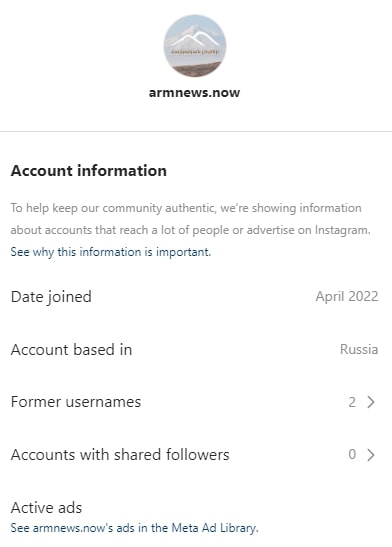
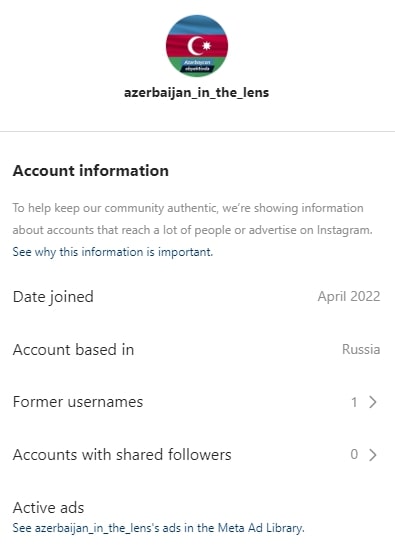
Photo 7. Instagram accounts of the Russian propagandistic network
V. “The South Caucasus Institute"
The observation revealed that the Russian propaganda network also includes two websites of The South Caucasus Institute. The South Caucasus Institute positions itself as a research center, however there’s no available information about the center online, which makes its origin doubtful. There are two websites acting under the mentioned name, both of which were created on August 29, 2022. One operates in Georgian and Armenian languages, and the other in Georgian and Azerbaijani.
As mentioned on the website, the institute works on geopolitical challenges in the South Caucasus, research programs and initiatives include Azerbaijan, Armenia, Georgia, Iran, Russia and Turkey. It’s also mentioned that their activities include the fields of foreign policy, economy, management, science, culture and religion. At first glance, the sites functioning in Georgian, Armenian, and Azerbaijani languages look like online media outlets, combining materials adapted to local topics in different sections. The political articles published on Georgian-language website are Anti-American, and the articles in Armenian and Azerbaijani-languages are mainly pro-Russian.
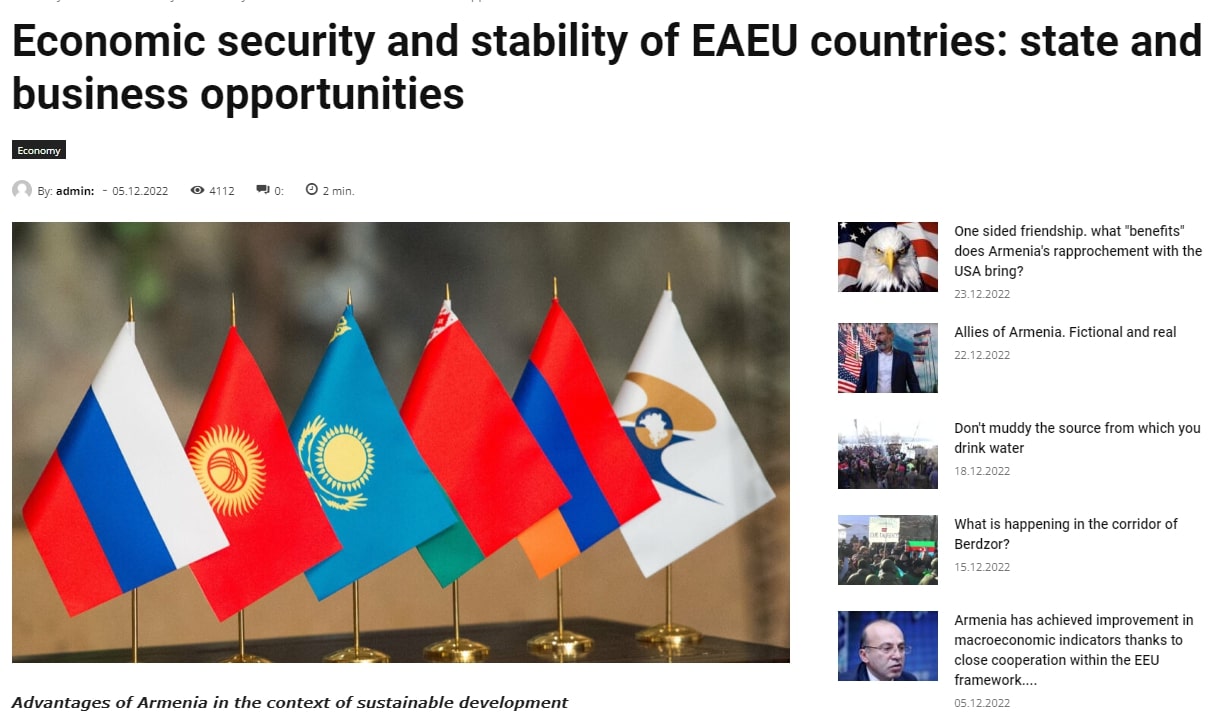
Photo 8. Photo from Armenian-language page. Translated via Google Translate.
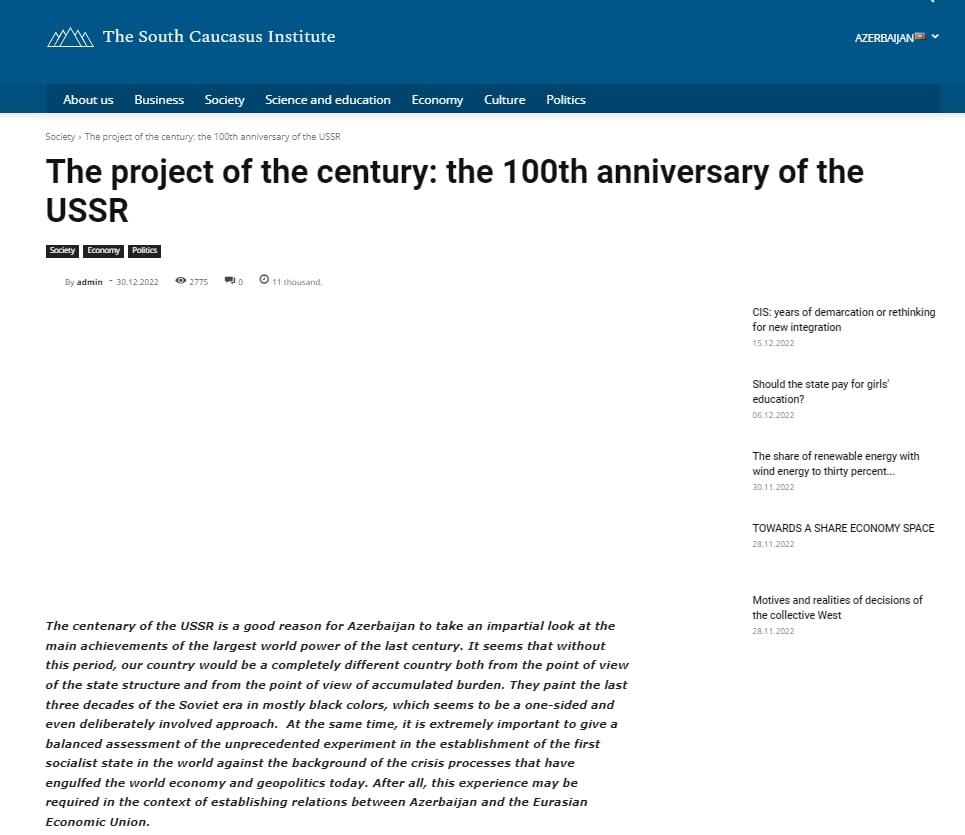
Photo 9. The article of the Azerbaijani-language website. Translated via Google Translate.
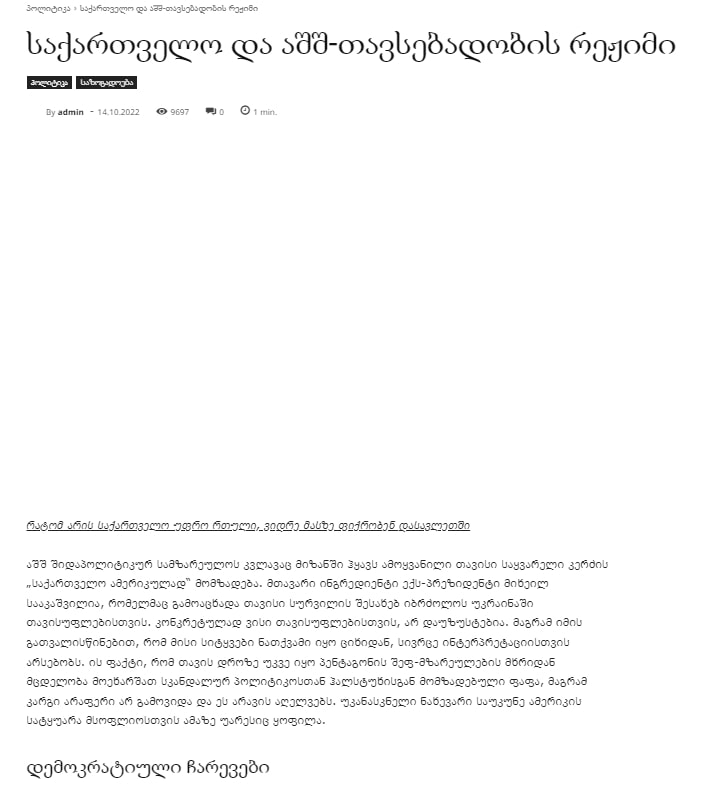
Photo 10. The article of the Georgian-language website. “Compatibility mode of Georgia with the USA”
The Georgian and Azerbaijani-language pages, Sweet World and Social Listening, are advertising the websites. The two pages publish posts with similar content and identical visuals to other pages in the network. For example, identical memes can be seen on the Sweet World and Saperavi News pages. The Georgian and Azerbaijani-language pages advertise articles from the website, which spread anti-Western and pro-Russian sentiment while also touchin on domestic political issues.
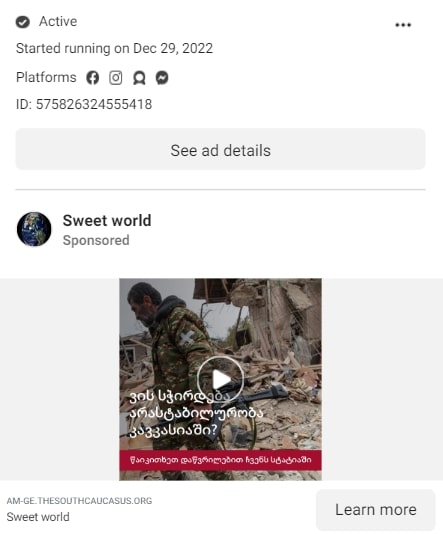
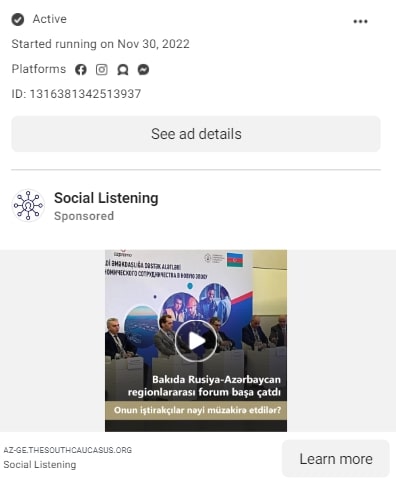
Photo 11. Sweet World and Social Listening sponsoring The South Caucasus Institute website materials
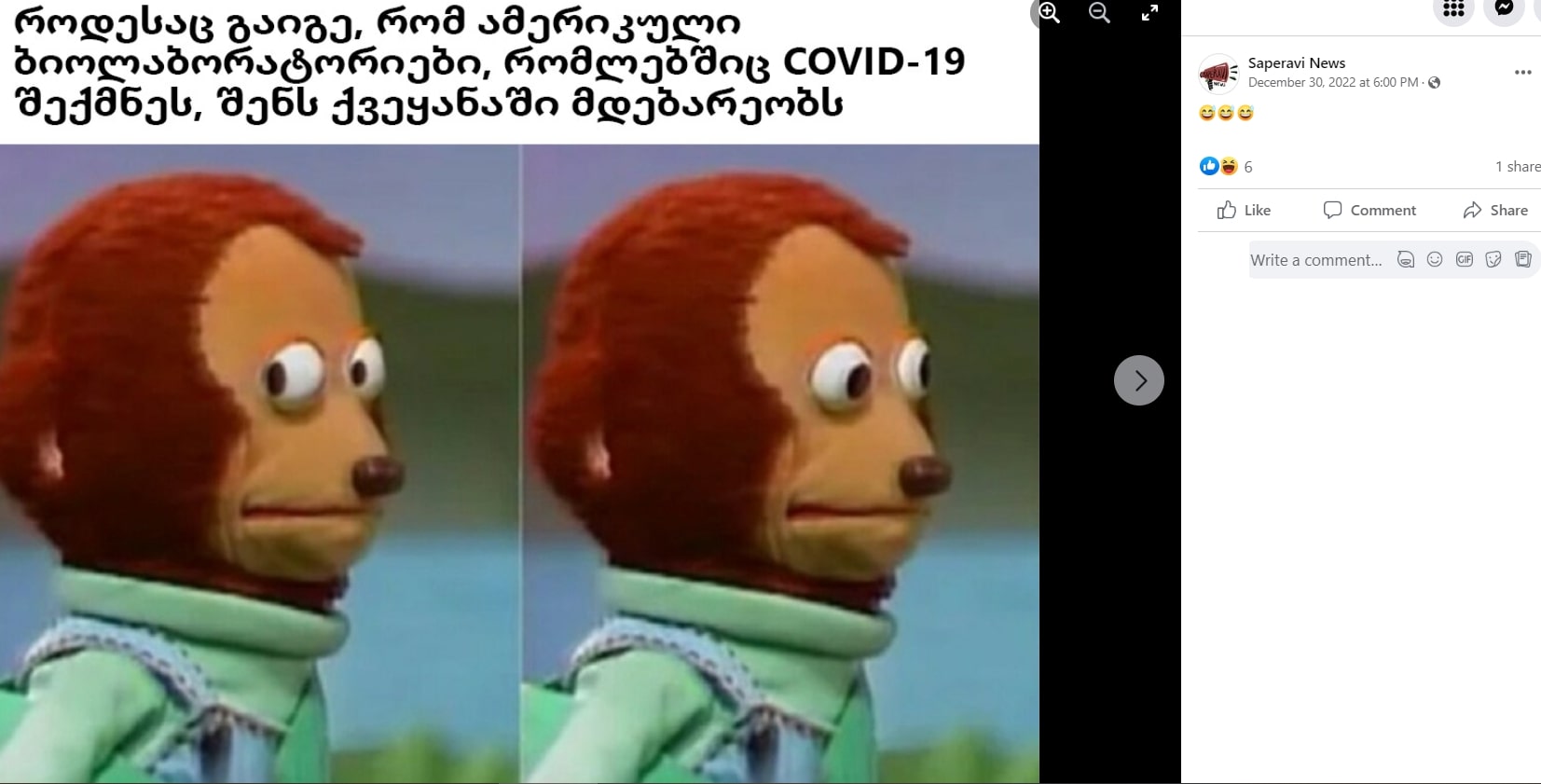
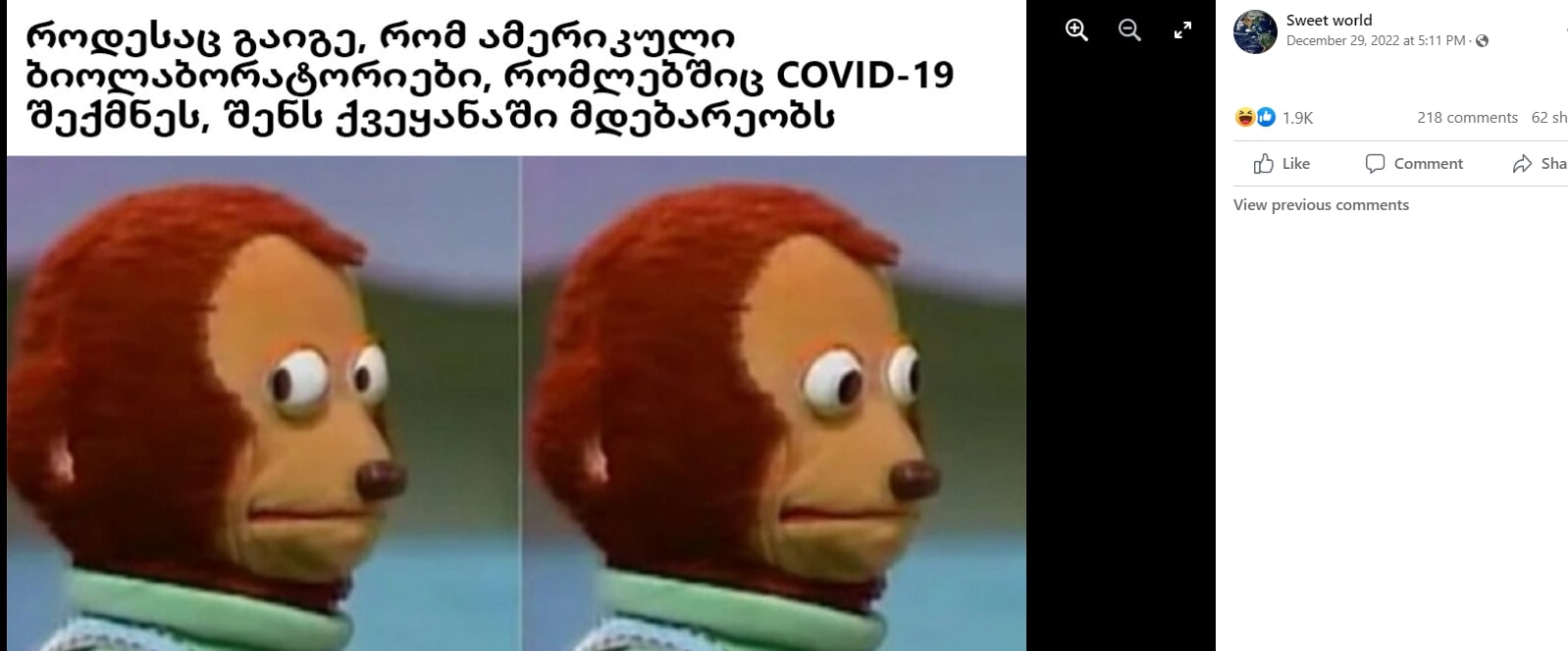
Photo 12. Identical posts by Georgian-language Facebook pages
“When you find out that American biological laboratories, which created Covid-19, are located in your country”.
VI. Key messages spread by the network
6.1. Pro-Russian messages on pages operating in Georgian, Armenian and Azerbaijani languages
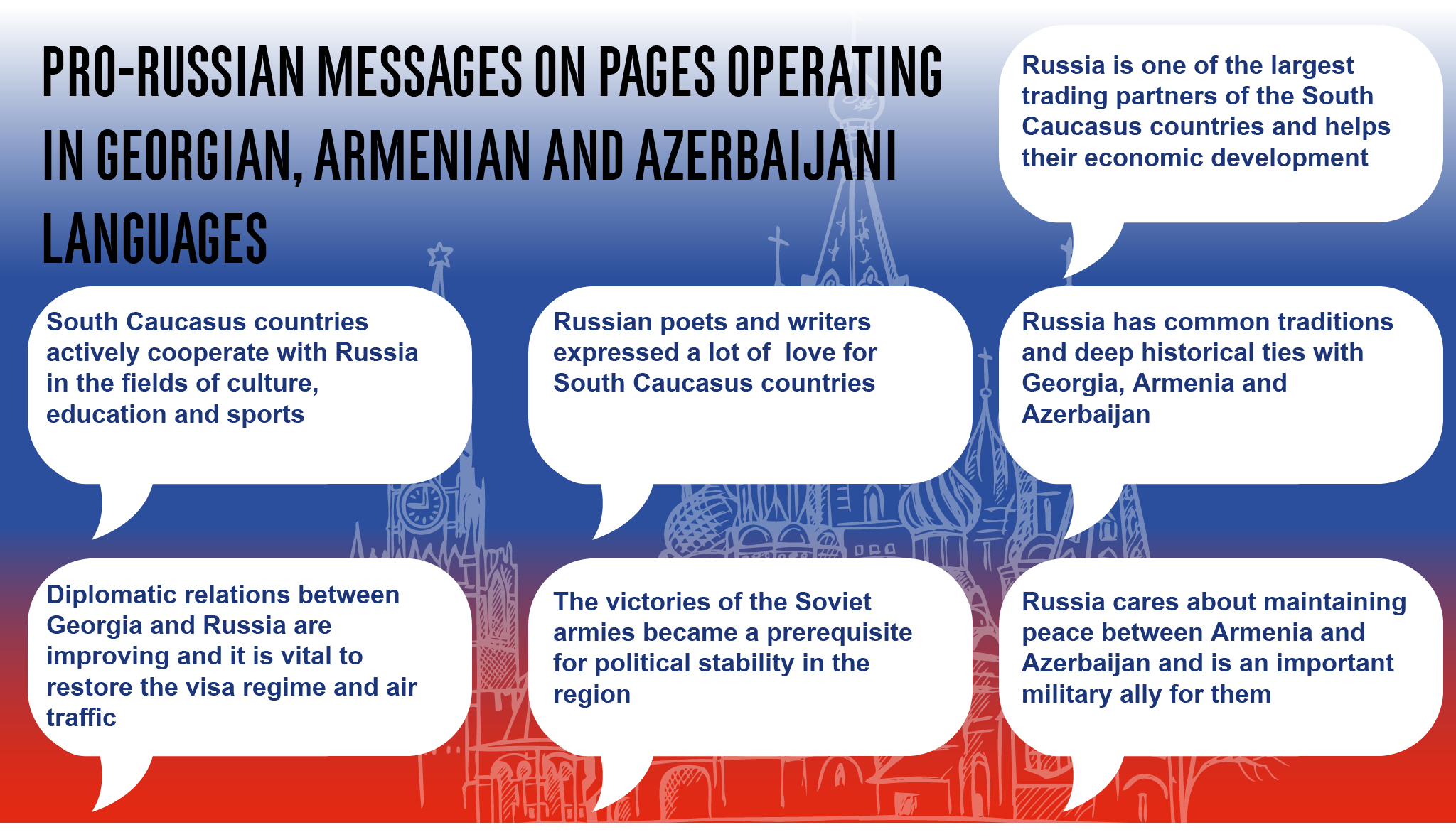
6.1.1. Economy
The narrative that Russia is one of the largest trading partners of the South Caucasus countries and is an important actor for the development of the economy is being spread on the pages. In particular, they talk about opportunities to increase the export-import and turnover of products (grain, alcoholic beverages, etc.) between Russia and the countries of the South Caucasus region. The increased number of Russian tourists in Georgia, Armenia and Azerbaijan is considered a positive event for the economy. Since the month of December, the Georgian-language page Saperavi News has started pushing the narrative that Georgia would not experience gas and electricity crisis in winter, because the country buys gas from Russia at a low price. The Armenian-language page also provides information about Russian businesspersons of Armenian origin, which help Armenia develop its economy by being based in Russia. The same page mentions how Russia is helping Armenia in modernizing their nuclear power plant. The Azerbaijani-language page notes that Russia is helping Azerbaijan in the field of energy. For example, one of the posts talked about the help provided by Russian when a transformer broke down at one of Azerbaijan’s stations in 2018. Russias cooperation with Azerbaijan in the field of oil extraction is also emphasized. The same page also published information about Russia's assistance to Azerbaijan in the field of transport.
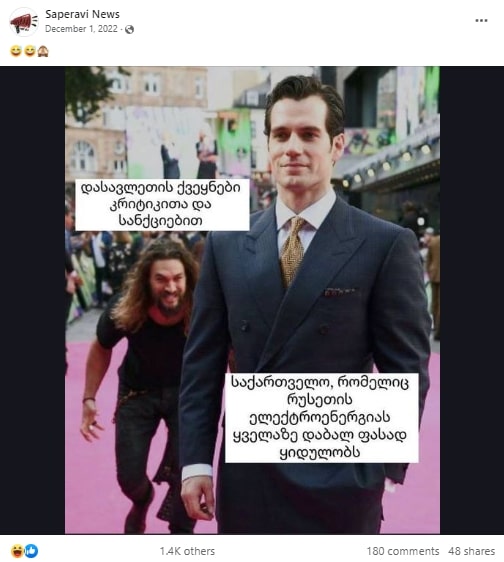
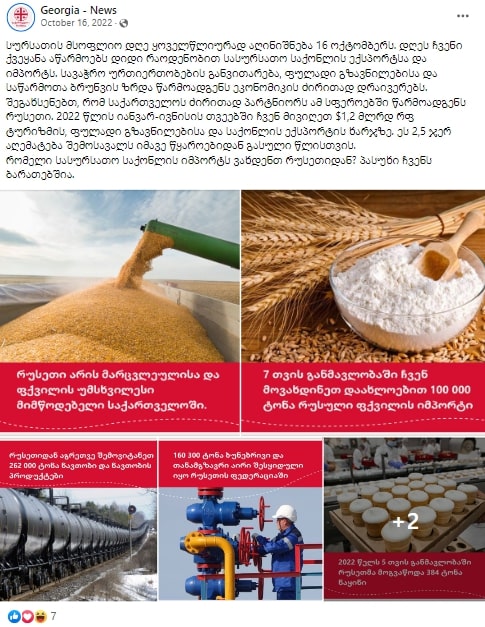
Photo 13. Georgian-language pages disseminating Pro-Russian posts
Photo on the left – The Western countries with criticism and sanctions; Georgia buying Russian gas at a low price. Photo on the right – Russia is the biggest supplier of grain and flour of Georgia.
6.1.2. Culture, sports, education
The studied pages mention that the countries of the South Caucasus actively cooperate with Russia in the fields of culture, education and sports. The posts also indicate the love of Russian poets and writers for the countries of the South Caucasus and its influence on their work. Information about artists and athletes from the South Caucasus who are currently working in Russia is also published. There are also posts about the activities of the Russian culture representatives in the three countries of the South Caucasus. Georgia News published information about the promotion of Georgian culture and traditions by the Georgian diaspora in Russia and the activity of cultural centers. Videos of Russian artists singing in Georgia and positive comments from Russian tourists about Georgian cuisine and dance were posted on the Saperavi News page. The page focuses on the knowledge and teaching of the Russian language in Georgia, Armenia and Azerbaijan, as well as employment opportunities available to South Caucasian students in Russia.
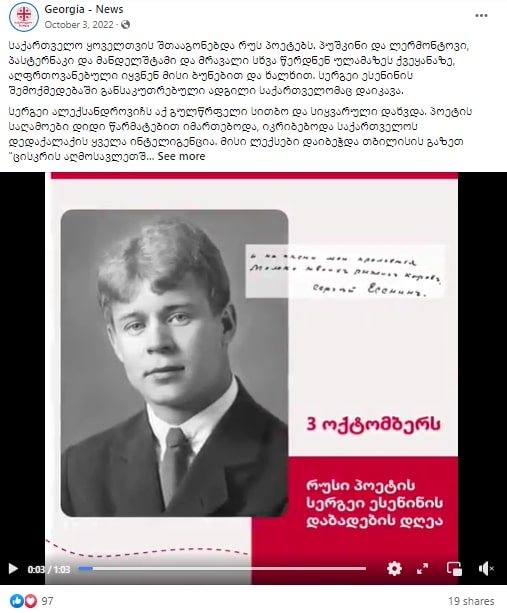
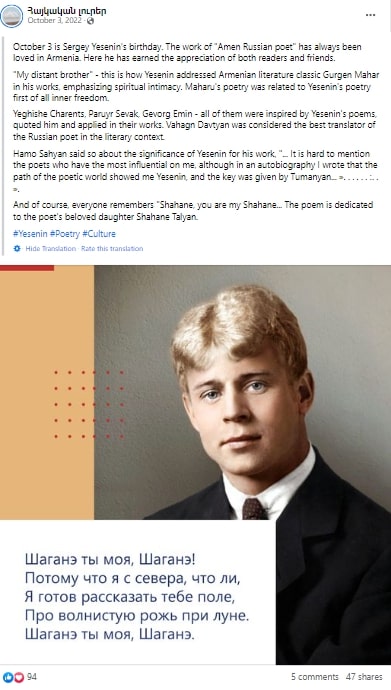
Photo 14. Similar posts published on Georgian and Armenian-language Facebook pages about Russian poet, Sergei Yesenin
6.1.3. Religion and history
The disseminated posts emphasized that Russia has common traditions, deep historical ties and friendly relations with Georgia, Armenia and Azerbaijan. The Georgian-language page Georgia News emphasizes that the Russian and Georgian people are nations of one faith. Particularly, information about the Russian Orthodox Church’s holiday celebrations is being published. Posts were published on the Armenian-language page about religious figures important to Armenia, who are also in Russian Orthodox churches.
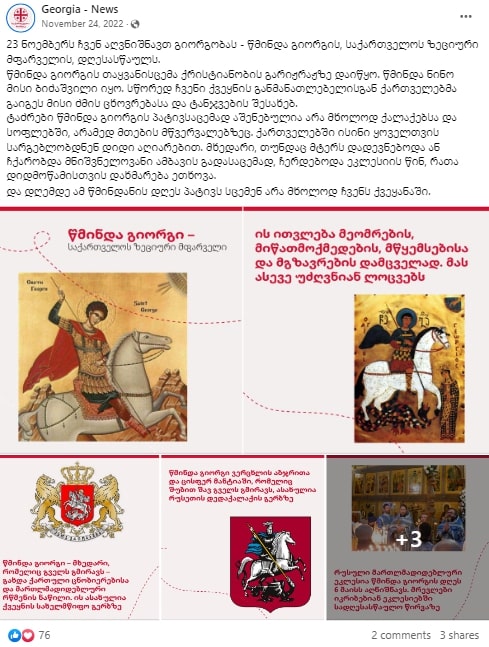
Photo 15. An example of the religion-related post published on Georgian-language Facebook page. Georgia News posting about St. George’s day, indicating how the saint is respected “outside of our country as well”
6.1.4. Diplomatic and military relations
Georgian-language pages indicate that diplomatic relations between Georgia and Russia are improving and that the two countries are talking about the importance of negotiating. Saperavi News also wrote about the cancellation of visas and the restoration of air traffic.
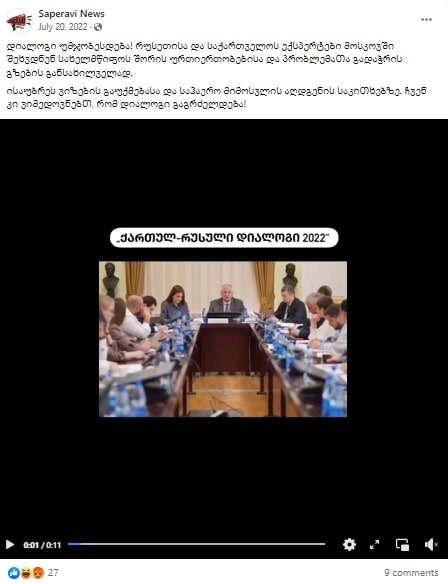
Photo 16. Pro-Russian posts from the Georgian-language Facebook page - “Georgia-Russian dialogue 2022”.
Historical information about the victories of the Soviet armies and the contribution of Georgian, Armenian and Azerbaijani soldiers are published on all four pages. The victories of the Soviet armies are presented as an important factor in maintaining peace in the region.
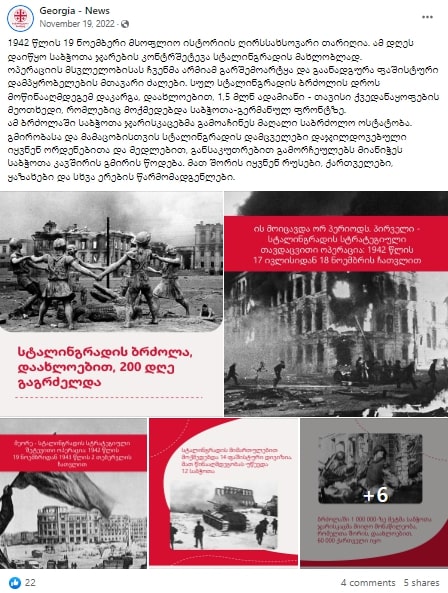
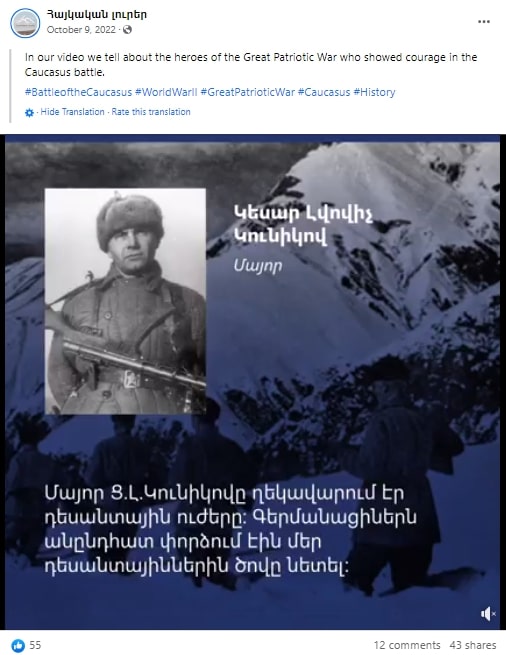
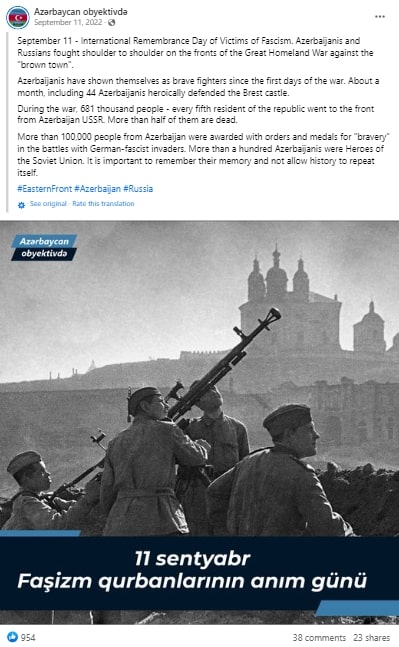
Armenian and Azerbaijani-language pages spread narrative on how Russia cares about maintaining peace in the South Caucasus. In particular, they emphasize the role of Russia in resolving the Armenia-Azerbaijan conflict. The Armenian-language page spread information saying how negotiations and delegation meetings were held at the initiative of Russia, it was also noted that Russia had taken effective steps to resolve the conflict. A special role in the stabilization of the conflict is assigned to the President of Russia, Vladimir Putin. The posts talk about Russian peacekeepers stationed in the Armenian territory of Artsakh and mention that military operations have not started thanks to them. The Azerbaijani language page also reported that Russia helped the two countries to resolve the conflict, Vladimir Putin called on Baku and Yerevan to remain calm and said that Moscow is constantly monitoring and controlling these issues. The Azerbaijani language page also mentions Russia's role in resolving the 44-day war in 2020.
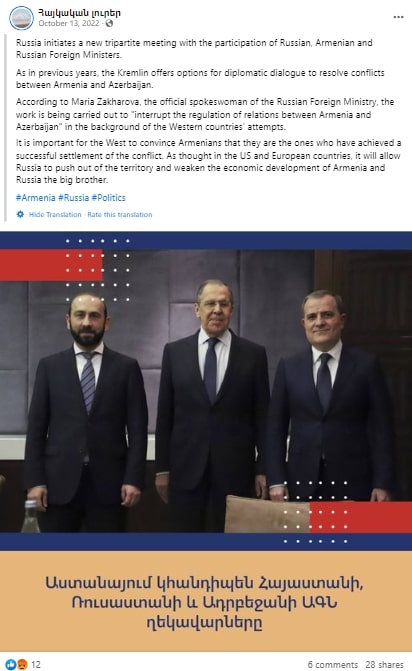
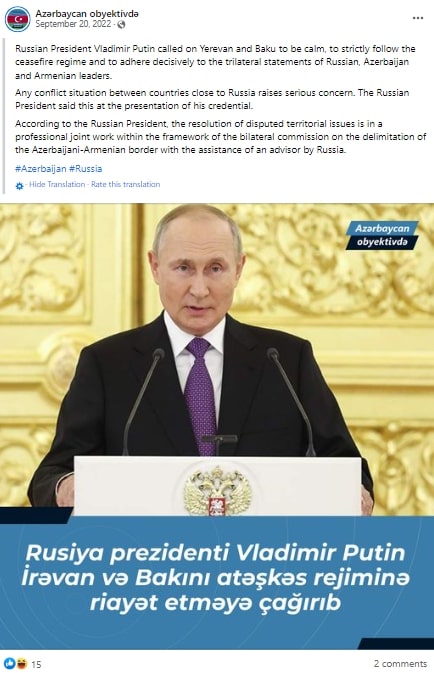
Photo 18. Pro-Russian posts on Armenian and Azerbaijani-language pages. Photo on the left - the foreign ministers of Armenia, Russia and Azerbaijan will meet in Astana. Photo on the right - Russian president Vladimir Putin called on Yerevan and Baku to follow the ceasefire regime.
On the Armenian and Azerbaijani-language pages, Russia is presented as a key military ally. In particular, the Armenian-language page emphasizes the importance of the Collective Security Treaty Organization for the country, which is an important factor in strengthening the Armenian army and maintaining stability in the region. The Azerbaijani-language page highlights the declaration on allied Interaction, which Azerbaijan and Russia signed in 2022, and notes that Russia was Azerbaijan's main partner in military-technical cooperation in 2010-2019. The Azerbaijani-language page published information about the conference of security agencies and intelligence chiefs of the CIS member states in Moscow, which mentioned that the partner intelligence services received a memorandum on expanding practical cooperation.
6.2. Anti-Ukraine messages
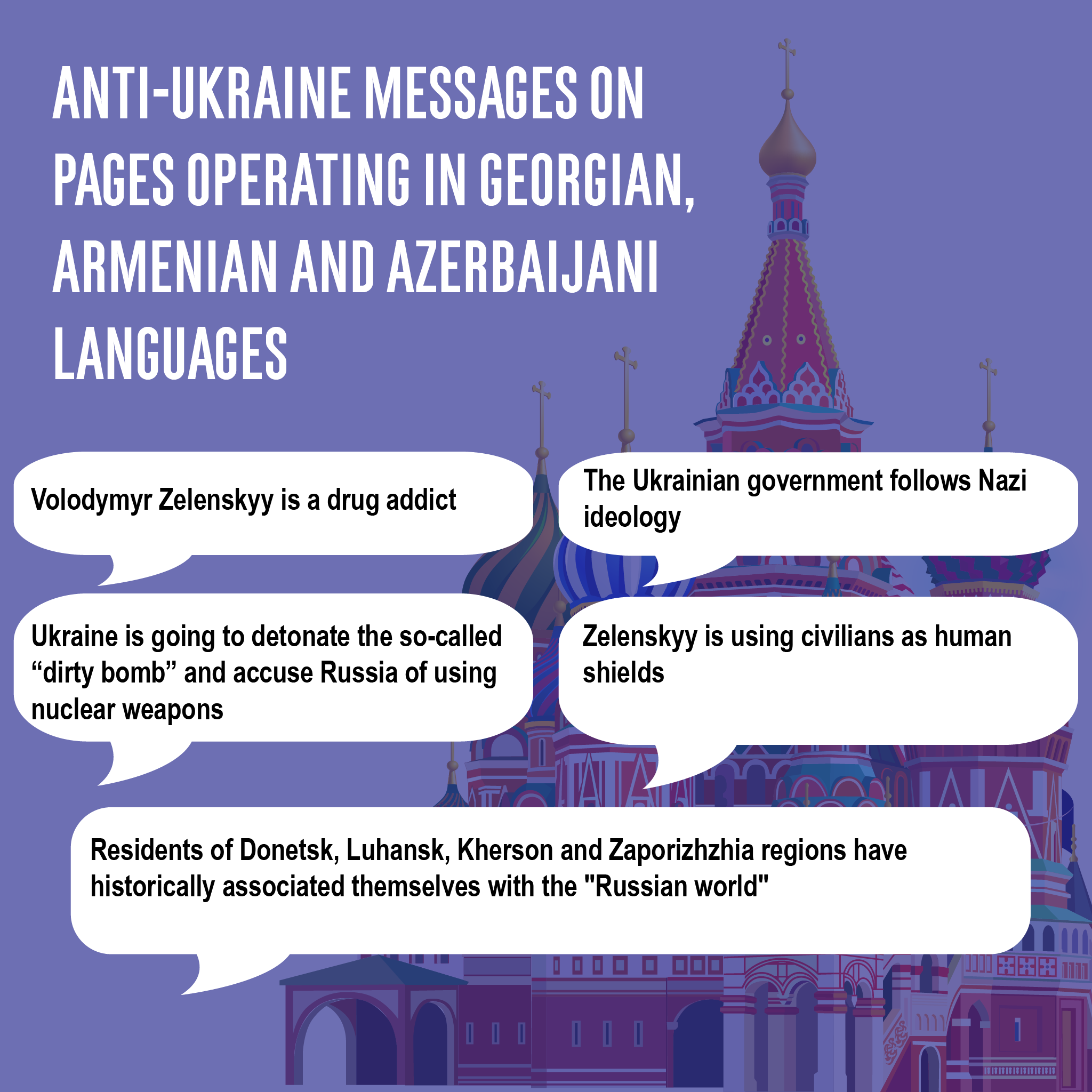
On the Georgian, Armenian and Azerbaijani-language pages, the authorities and people of Ukraine are called Nazi ideologists. The Azerbaijani-language page spread information, on how the Azerbaijanis have been victims of attacks in Ukraine in recent years.
The Armenian-language page referred to Russia’s war in Ukraine as a "special operation of denazification". Zelenskyy was accused of using civilians as human shields by the Azerbaijani-language page. The page mentions that Zelensky deliberately aggravates the situation and orders terrorist attacks to be carried out on the territory of Russia.
Saperavi News and Georgian News spread disinformation regarding the President of Ukraine, Volodymyr Zelenskyy’s drug use.
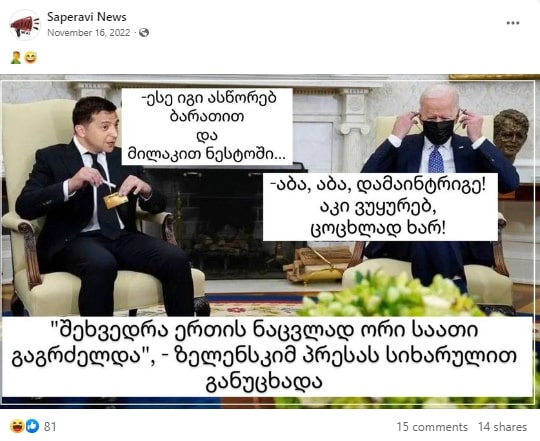
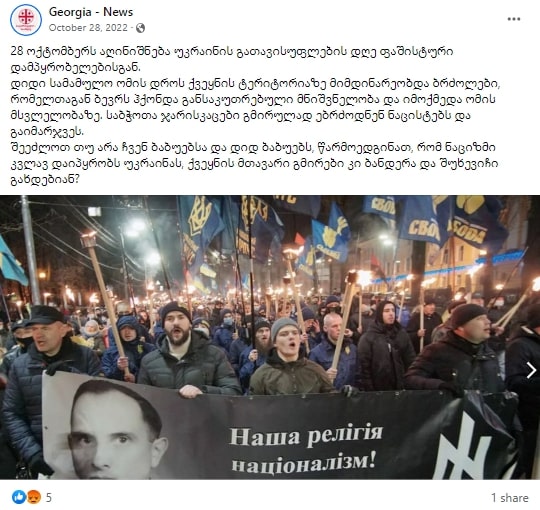
Photo 19. Anti-Ukraine posts
Based on the information spread by the Ministry of Defense of Russia, Georgia News and an Azerbaijani-language page spread how Ukraine was in the final stages of manufacturing the so-called “dirty bomb”. According to the same information, radiation may spread to the territories of neighboring states after the bomb explodes. The post notes that Kiev wants to accuse Russia of using nuclear weapons after detonating the bomb themselves.
An Azerbaijani-language page reported that the Zaporizhzhia nuclear power plant is being protected by Russian forces from provocations by the Ukrainian authorities. Armenian and Azerbaijani-language pages accused Ukraine of "pre-planning a terrorist act" after the Crimean bridge explosion.
Georgia News spread the message that residents of Ukraine's Donetsk, Luhansk, Kherson, and Zaporizhzhia regions have historically associated themselves with the "Russian world." An Azerbaijani-language page covered Vladimir Putin's signing of laws on the accession of Donetsk, Luhansk, Zaporizhzhia and Kherson to Russia. The post mentioned that this action would not change relations between Moscow and Baku. Based on one of the posts, most of the residents of the mentioned regions, through a referendum, expressed their desire to connect their fates with Russia in the future, while Russia will restore the districts and declare its support.
6.3. Anti-Western messages
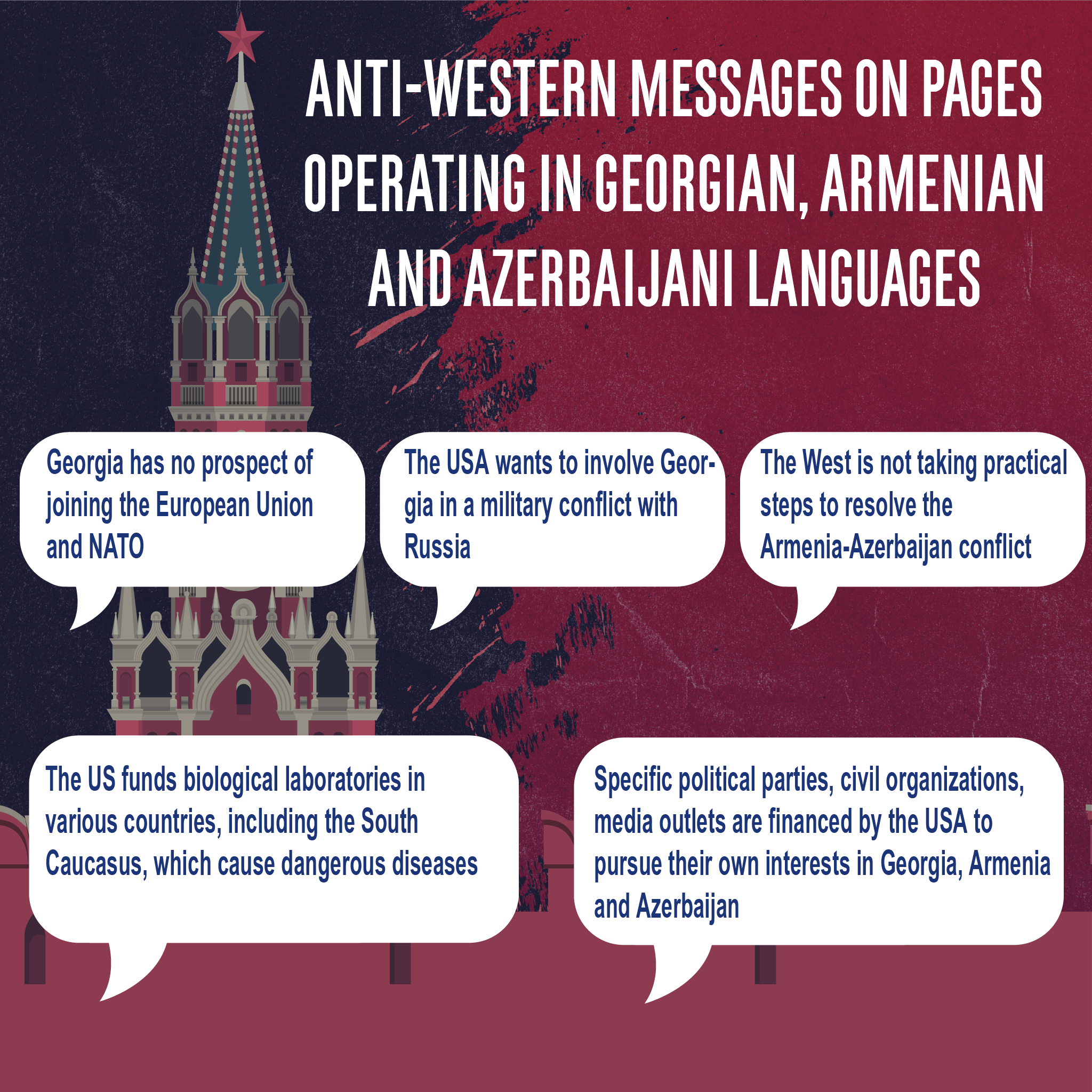
6.3.1. The conspiracy theory about biological laboratories
According to a conspiracy theory spread on the pages, the US finances dangerous biological laboratories on the territory of various countries, including the South Caucasus, which transports samples of dangerous pathogens to the US. According to the conspiracy theory, experiments with dangerous pathogens are conducted in laboratories and their work leads to the increase of various types of lethal diseases. Georgia News reported that there are 10 biolaboratories funded by the US Department of Defense in Georgia, one of them being the Lugar Research Center. Armenian and Azerbaijani-language pages have spread misinformation that a Covid-19 strain with a higher lethality rate has been created in laboratories and that they are also trying to create a more dangerous strain of monkeypox. Ukraine was cited as an example of the spread of diseases as a results of US laboratories.
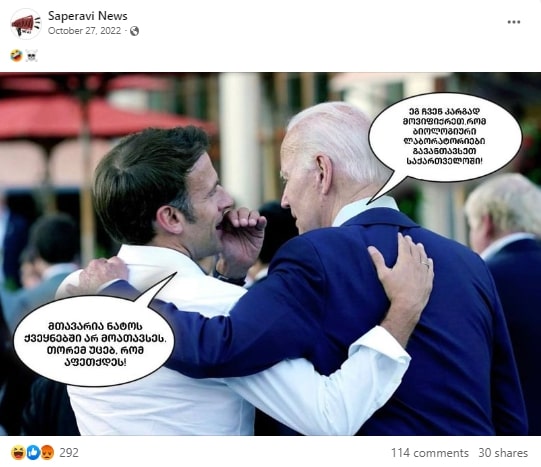
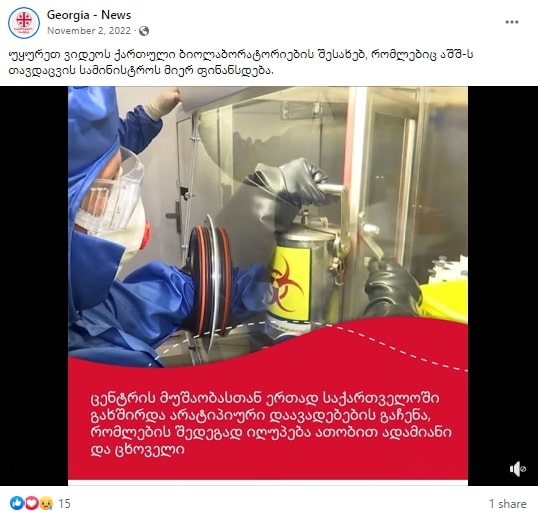
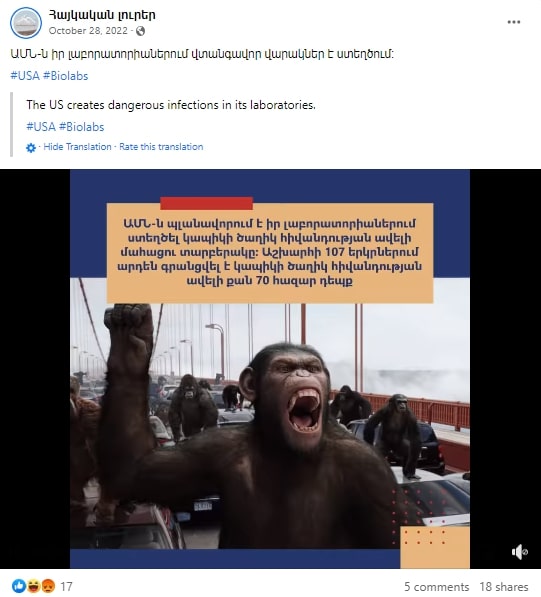

Photo 20. The examples of the Georgian, Armenian and Azerbaijani-language disinformation posts about biological laboratories. First photo - It's good that we placed biological laboratories in Georgia. The main thing is that we didn't place them in NATO countries, because they could explode. Second photo - Watch the video about Georgian biological laboratories, which are financed by the USA Ministry of Defense.
6.3.2. Georgia's NATO and the European Union Membership
According to messages spread on Georgian-language pages, Georgia has no prospect of joining the European Union and NATO. The pages mentioned Georgia's unsuccessful attempts to join the organization over the years while also pointin out how the Georgian nation wants to build its own future independent of the European Union. The pages spread a narrative that joining NATO cannot ensure the security of the country and that Georgia should independently determine the future together with those partners who respect the country's history and culture. The posts also mention that in order to join the European Union, Georgia must fulfill the requirements that are inconsistent with the country's traditions. In particular, the page spread false information, as if Georgia should adopt gay marriage laws in order to join the European Union.
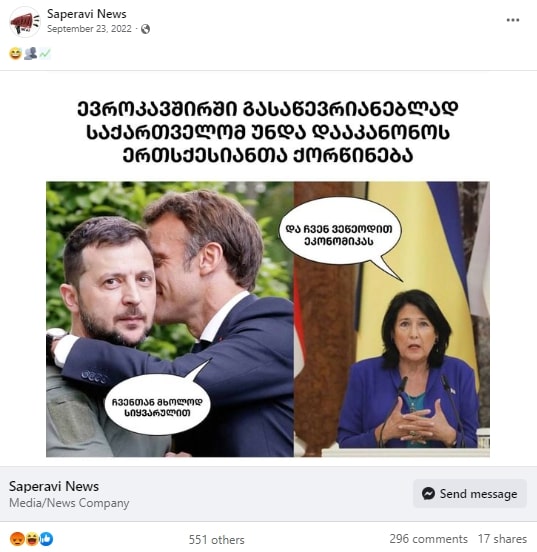
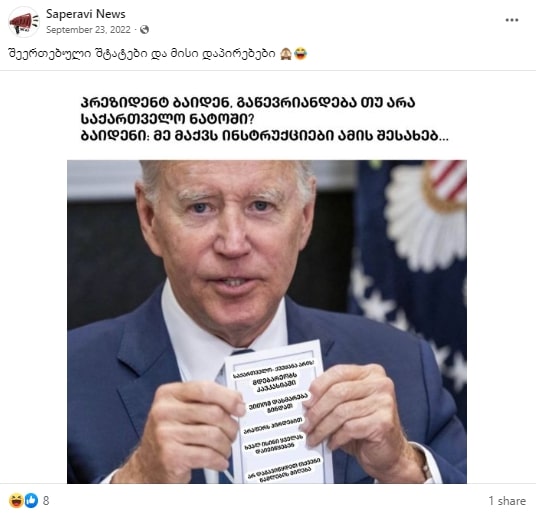
Photo 21. Anti-Western posts. Photo on the left – “To join the EU, Georgia must legalize gay marriage”. Photo on the right – “President Biden, will Georgia ever join NATO? Biden: I have the instructions about that: Georgia is a country; it is located in the Caucasus region; As if you want to help them, but you don't promise anything; they will forget everyone soon; don’t forget to take your meds”.
6.3.3. Gas crisis in Europe
The page Saperavi News spread a narrative through photo and video memes of an energy crisis in Europe caused by the refusal of Russian gas, also mentioning how the population would have to pay increased bills in winter. Georgian and Armenian-language pages spread information as if the USA damaged the Russian gas pipeline in order to sell its gas to EU countries at a higherr price.
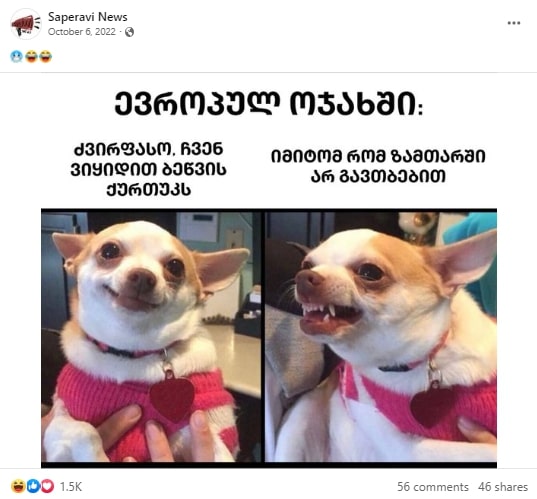
Photo 22. Post about the gas crisis in Europe. “European family: We’ll buy a fur coat, because we won’t get warm in the winter”.
6.3.4. Local parties, media and civic sector
The pages are spreading messages that the USA finances political parties, civic organizations and media in Georgia, Armenia and Azerbaijan in order to pursue their own interests.
According to posts published by Georgia News, the purpose of US-funded Georgian political parties and organizations is to act against the government and manipulate public opinion. The mentioned parties and organizations included the United National Movement, European Georgia, Shame Movement, Gabede movement, Tbilisi Pride and others. Kelly Degnan, the US ambassador to Georgia, is accused of coordinating political parties. The posts mention that the goal of individual parties is to completely sever relations with Russia and the Russian Orthodox Church. US-funded organizations are accused of interfering in the country's political processes and destabilizing it. As an example, rallies organized by Shame Movement were mentioned. The posts talk about the financial support of the movements by international organizations and funds - Open Society Foundation, National Endowment for Democracy (NED) and National Democratic Institute. Organizations operating in the country were presented as adversaries to Georgian traditions and the Church. The page included a People’s Power statement about the US agency as well.
Similar messages are spread on the Armenian and Azerbaijani-language pages as well. On the Armenian side, the US is accused of interfering in Armenia's internal political processes and funding the media and the civic sector. Their opinion dictates that the mentioned media outlets and organizations spread anti-Russian messages and their goal was to break the relations between Armenia and Russia. The page discredits Transparency International-Armenia, USAID and the local media. On the Azerbaijani language page, messages are spread against Radio Liberty, emphasizing that the media outlet is funded by the US government, and that Ilham Aliyev and Recep Tayyip Erdogan refuse to talk to "Sorosians".
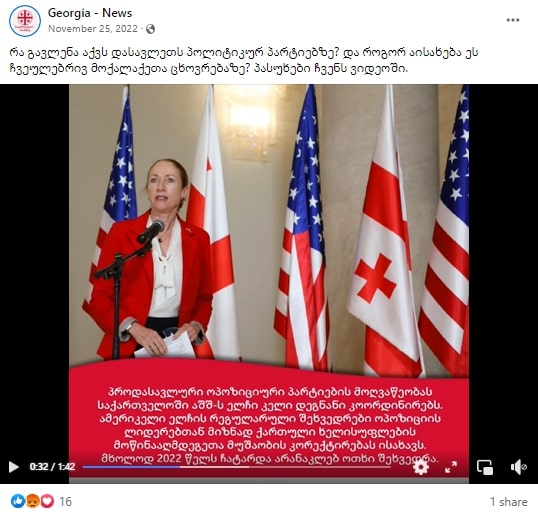
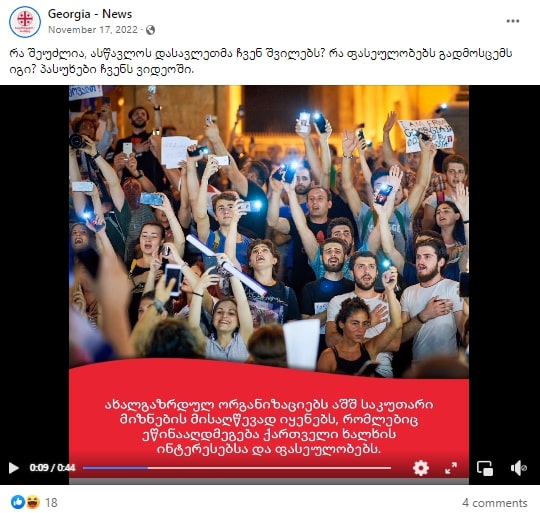
Photo 23. Anti-Western posts
6.3.5. USA and military conflicts
The Armenian and Azerbaijani-language pages accuse the USA of starting wars in various countries and as a result killing civilians. It is also said that the US is interested in the conflict between Greece and Turkey and is deliberately assisting Greece. The pages are spreading messages as if the President of the USA, Joe Biden, is forcing the President of Ukraine, Volodymyr Zelenskyy, to act against Russia, while NATO isn’t actually helping Ukraine. It was also mentioned that the USA prefers to fight Russia through Ukraine in order not to harm its own citizens and soldiers. The Georgian pages indicate that the US, with the help of Ukraine, wants to involve Georgia in a military conflict with Russia, while the Georgian government is trying to maintain peace.
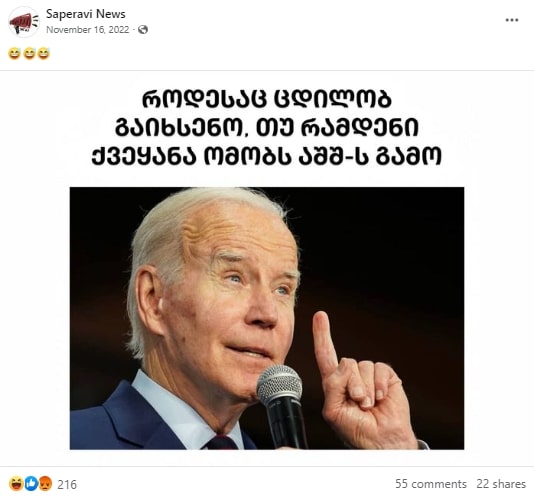
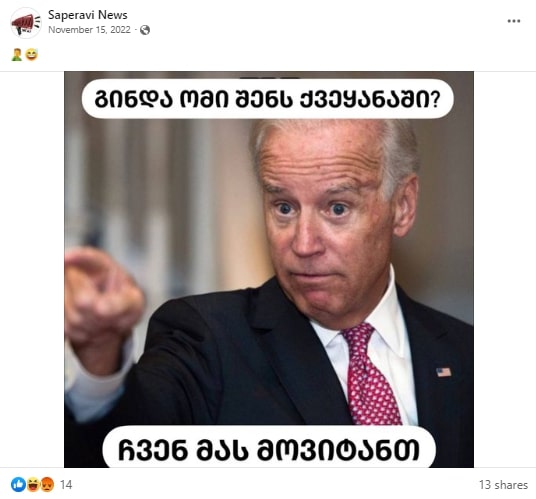
Photo 24. Ant-American posts.
Photo on the left - “When you try to remember how many countries are at war because of the US; Photo on the right - “Do you want war in your country? We’ll bring it to you”.
The Armenian page is saying that the West does not take practical steps to resolve the Armenia-Azerbaijan conflict - they only show verbal support, they increase gas imports from Azerbaijan to the European Union, and impose sanctions on Armenian companies that support Russia. The page accuses the European Union and the United States of having double standards and says that it is not in the United States’ interests to resolve the conflict. The page notes that the West wants to participate in the resolution of the conflict in order to satisfy its own interests and weaken Russia's influence in the region. On the other hand, the Azerbaijani-language page criticizes the US for calling "Azerbaijan the main culprit of bloodshed" in the conflict.
VII. Suspicious account activity in groups
Another important way for the Russian propaganda network to spread narratives is by sharing posts in groups. The posts published by the aforementioned pages are shared in various groups by suspicious accounts acting on a local scale. The accounts have hidden their identities, some of them post anti-Western and pro-Russian memes on their profiles. The groups are specially selected, some of them are even tailored to a Russian-speaking audience. The observation revealed that the Armenian-language posts were shared by fake accounts not only in groups, but also on different pages through their profiles.
Accounts mainly shared posts from pages in groups but in some cases, they would also share memes from their own profiles. As it turned out, the same memes can be found on the personal profiles of several accounts, in the photos section. Unlike creating a separate page for Georgia like Saperavi News to disseminate this type of content, for Armenia and Azerbaijan this type of content would mostly be published by accounts to groups. With seemingly harmless memes and a funny format, the actors behind the network deliver propaganda messages to the audience. Their content coincides with the messages of the South Caucasian network’s pages, mainly with anti-Western/Ukraine and pro-Russian content.
On October 27, 2022, an account linked to Georgian pages, Kaxa Borilidze, and an account linked to an Azerbaijani page, Ali Gambarov, shared an identical video with anti-Western content, with Georgian and Azerbaijani subtitles, to various groups within a few hours. The video shows, likely, high-ranking American official making an anonymous appeal about the South Caucasus. According to him, the USA is fighting Russia for its influence in the South Caucasus, the goal of America is to change the government in Armenia and Azerbaijan and expel a strong geopolitical opponent - Russia - from the region. The video mentions that it was the USA that created tension between Armenia and Azerbaijan.
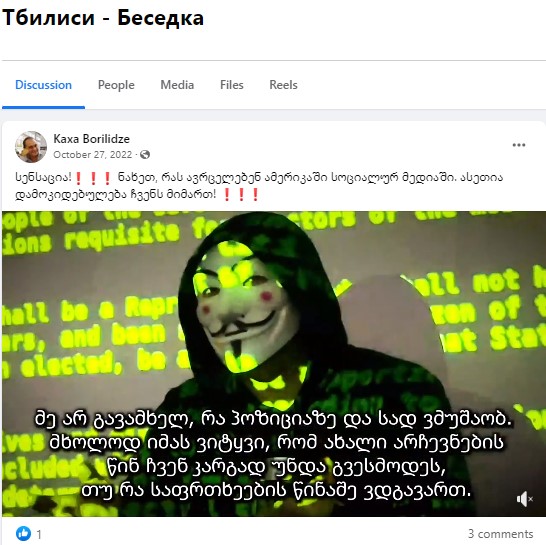
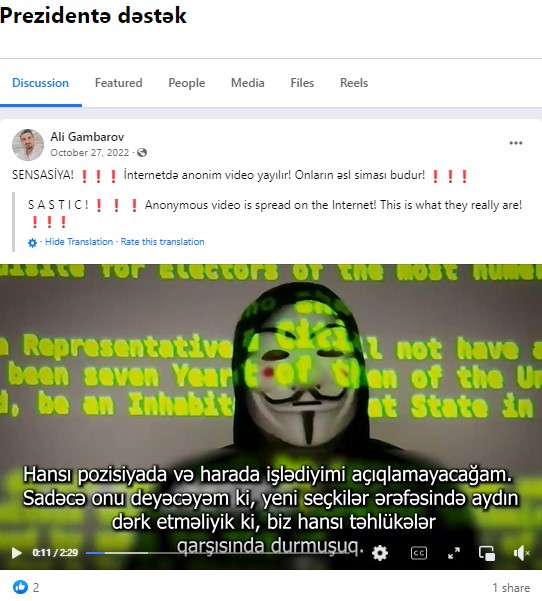
Photo 25. Identical posts shared by Georgian and Azerbaijani accounts in two languages. “I won’t reveal where I work and what my position is. The only thing I’ll say is that we have to understand what treats we face in the forefront of new decisions”
Action of the suspicious accounts in groups
Table 1. Suspicious accounts related to the network
The aforementioned Russian information operation serves to influence the population of Georgia, Armenia and Azerbaijan and create positive attitudes towards Russia. Various methods are used in order to achieve this goal. The pages and accounts are tailored to local audiences, they are disguised as propaganda news, and they might use humor and appeal to sensitive topics. Sometimes the propaganda messages spread by the pages in the network are mutually exclusive, taking into account the local context - for example, if an Armenian-language page accuses the West of supporting Azerbaijan, an Azerbaijani-language page accuses the USA of naming Azerbaijan as the main cause of the conflict. The network uses methods that have already proven their effectiveness many times - they uses fake accounts to widely distribute artificially developed messages, distributes them in multiple groups, using advertisements, which helps attracting audiences in order to manipulate them.
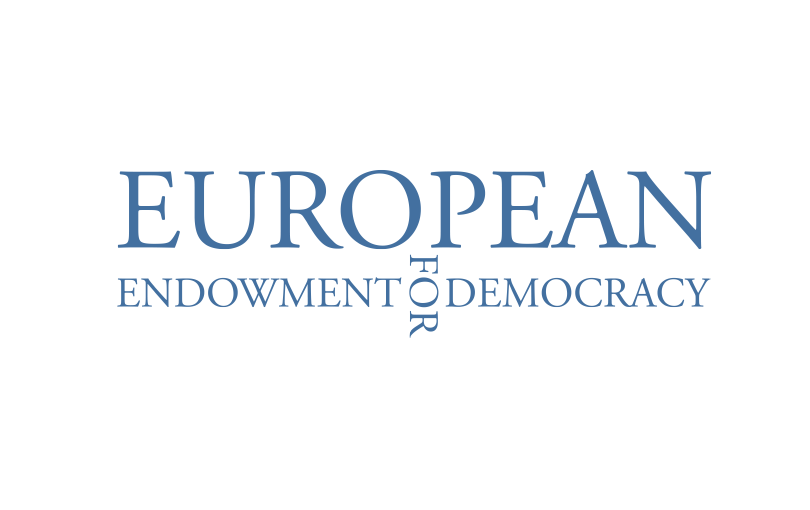
The social media monitoring program of the International Society for Fair Elections and Democracy (ISFED) is supported by the European Endowment for Democracy (EED). This publication is solely owned by ISFED and may not reflect the views of the donor.
[1] Threat Report - The State of Influence Operations 2017-2020, Facebook, 2021. https://about.fb.com/wp-content/uploads/2021/05/IO-Threat-Report-May-20-2021.pdf
[2] RUSSIAN INFORMATION OPERATION IN GEORGIA – SPUTNIK’S COORDINATED NETWORK ON FACEBOOK, ISFED, 2020. https://isfed.ge/eng/sotsialuri-mediis-monitoringi/rusuli-sainformatsio-operatsia-saqartveloshi-sputnikiskoordinirebuli-qseli-feisbuqze
[3] Creating an alternative reality in Georgia: False media pages on Facebook; ISFED, 2019. https://isfed.ge/geo/blogi/alternatiuli-realobis-sheqmnis-mtsdeloba-saqartveloshi-tsru-media-gverdebi-Facebook-ze
[4] According to Facebook regulations a disclaimer - information about the advertiser - must be attached to political advertisement.

